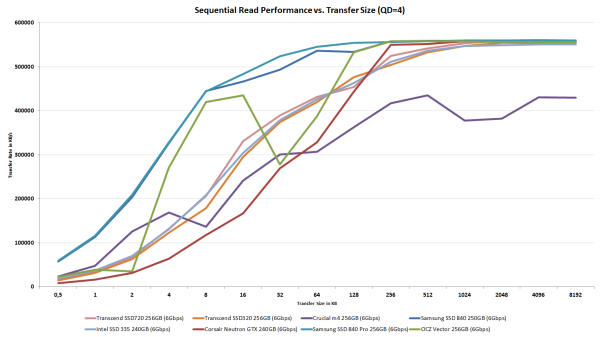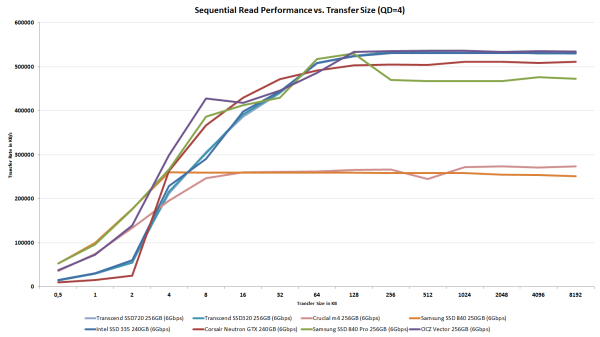Transcend SSD320 & SSD720 (256GB) Review
by Kristian Vättö on January 25, 2013 11:31 AM ESTPerformance vs. Transfer Size
ATTO offers a quick way to measure performance at varying transfer sizes. While real world IOs mainly concetrate on IO sizes of 4KB, 8KB and 128KB, it's important to get a big picture of the drive's performance. There is once again hardly anything surprising, both the SSD320 and SSD720 are on par with Intel's SSD 335. Overall the SF-2281 is starting to show its age as especially in read performance Samsung's SSD 840 Pro and OCZ's Vector are substantially ahead.
Click for full size












34 Comments
View All Comments
Rick83 - Friday, January 25, 2013 - link
I have two SSDs that were reasonable unique when I got them, both from Transcend, so I am not sure how you can complain about that.One is an IDE Flash module, and the other is a 44pin IDE 2.5"SSD. Both use SLC flash.
They were in the industrial/module market quite early, and quite strongly.
Adding some cheaply implemented Sandforce drives allows them probably to sell more volume, and thus get better pricing on flash. I'm not sure if that is their main market though.
Meanwhile, there is slightly more competition in IDE SSDs, but then that market is also not going to grow very much. Of course there are also SSD and USB modules available, so that's also an interesting niche, where there is a different market situation, than for "mainstream" SSDs.
Finally, I consider the Transcend brand to be relatively strong in the flash memory market, they've been present for quite a while.
Customer support in Europe is also reasonably good.
Kristian Vättö - Friday, January 25, 2013 - link
I'm aware that Transcend has "niche" products that are aimed for very specific uses. What I meant, however, was that their mainstream (mainly 2.5" SATA) lineup is not very special. Like I said, there are probably a dozen manufacturers with similar SandForce SSD lineups.The final part of the article was merely a general observation of the current SSD market, I didn't aim it specifically at Transcend (it's something I've been wanting to say for a while). Transcend does have fairly large presence in Europe (I'm from Finland myself) when it comes to SD cards and USB sticks, but not really in SSDs (then again, SSDs aren't everyday items yet, so that matters too).
Overall I'd just like to see more non-SF SSDs. You can't really gain any major market share with SandForce drives anymore, there are too many competitors.
kmmatney - Friday, January 25, 2013 - link
It is nice that they include a toolbox. I have a few SSDs in Windows XP machines at work, and I like being able to manually TRIM the drive. I buy Samsung and Intel SSDs just for the toolboxes they provide, but this would be a viable option now as well.Kristian Vättö - Saturday, January 26, 2013 - link
Keep in mind that the TRIM or secure erase functions in the toolbox do not work, like I mentioned in the article.Death666Angel - Friday, January 25, 2013 - link
It's really sad that most of these SF based drives aren't even that much cheaper (if at all) compared to the big brand names you mentioned.Samus - Saturday, January 26, 2013 - link
Right. There's no logical reason to buy a sandforce drive when the Samsung 830/840 and Crucial M4 have the same (or lower) price with superior reliability and relatively identical performance.Then there is the 840 Pro which has ridiculous performance and presumably excellent reliability.
Don't get me wrong though, I think the Intel SSD 330/335 is a great value and it is the only Sandforce drive I'd buy. Every OCZ SF drive I, my family, or friends, have ever had, has inexplicably failed.
speculatrix - Saturday, January 26, 2013 - link
Having experienced OCZ technical support when trying to resolve linux driver problems with their Revo cards (ongoing for 3 months with tgem holding onto $1000's of worth of cards) I shall never buy an OCZ product ever again.They fail to communicate or use their own ticketing system effectively, pronounce testing done when it hasn't, and generally all we feel is that our time and money has been wasted.
embzyk - Sunday, January 27, 2013 - link
I see write amplification less than 1.0 a logical reason, and the reason why every SSD I buy is sandforce based. The first one I ever bought died, but its replacement and 7 others are going strong - including 4 from OCZ.twotwotwo - Friday, January 25, 2013 - link
"The client SSD market currently has more manufacturers than it can feed in the long run."If the fixed costs are low enough, it may take the small ones a long time to go away--if everyone pays the sameish rate for NAND, controller licenses, etc., they may be more like PC builders than HDD makers.
If that changed significantly--say, if SandForce and other competitive controllers were bought by certain makers who used them exclusively--that math could change quickly.
hfm - Friday, January 25, 2013 - link
I bought one of the 512GB SSD720 a while back because it was the cheapest 500MB/s 512GB SSD at the time I bought it (paid $399, walked to B&H to get it). I have been extremely happy with it. The Samsung 512GB drive was much more expensive at the time. My primary use case for it is gaming laptop, so I felt the cost increase for a better drive would see a negligible boot/load time increase.Of course I keep it backed up by cloning to a second spinner in the laptop and then again to my nas, so I don't completely trust it's long term reliability. It's been bullet proof and screaming fast so far.